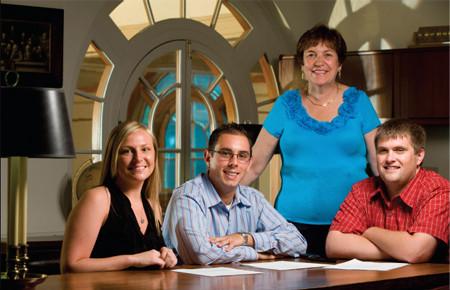Graduate Faculty Mentor Award, 2010
Psychology, Coordinator of Justice Studies

In a way that only a microbiologist could, Vaughn Cooper lights up when he explains what makes a bacterium he is describing “charismatic.” Calling up an image on his computer, Cooper points toward the diversity of cell shape, composition, and pigmentation in three mutants of Burkholderia cepacia, a normally harmless organism that can be life-threatening for people with cystic fibrosis.
“The molecular diversity this bug can generate in a short amount of time is remarkable,” he says. “When most people think about evolution, they’re imagining changes that take place over thousands of years. Here, we’re talking about dramatic metabolic adaptations that occur in weeks.”
Cooper jokingly refers to his field as “ecology and evolution for the impatient.” Pointed toward microbial evolution by terrific mentors, he strives to inspire the same level of excitement in his own students. In his upper-level Microbial Ecology and Evolution class, for example, students contribute to a blog that allows them to comment on each others’ work and key articles in the field—and to interact with those articles’ authors.
“Designing this tool took a lot of work, but the student response has been overwhelmingly positive,” says Cooper’s colleague, Professor Thomas Pistole. “It’s just one illustration of the initiative and dedication that Vaughn brings to each of his courses.”
In the last year alone, Cooper’s initiative has brought in an impressive $1.6 million in grant awards, including a prestigious CAREER award from the National Science Foundation. He is collaborating with colleagues in the UNH computer science department and the Hubbard Genomic Center on several cutting-edge initiatives. Beyond UNH, he has developed a program to introduce college-level microbiology at the high school level, offering summer internships in his lab to qualified students.
It’s easy to imagine Cooper spends all his time doing science, but he is also an internationally ranked triathlete who has completed 16 Ironman events.
“For a long time, I was better known as a triathlete than as a scientist,” he says. “Then again, I wasn’t well known as a scientist.” That, like the very field he studies, is rapidly changing.
—Kristin Duisberg
About this Award
The Graduate Faculty Mentor award is designed to honor a faculty member whose commitment to excellence in graduate student training has contributed significantly to graduate students’ professional development. Forms only accepted during application period.
